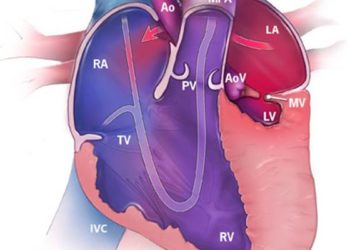Apixaban is superior to rivaroxaban in patients with atrial fibrillation and valvular heart disease
1. In comparison to rivaroxaban, apixaban was associated with a lower rate of bleeding events and embolic events amongst adults with both atrial fibrillation (AF) and valvular heart disease (VHD).
2. There were no significant differences in all-cause mortality between apixaban and rivaroxaban observed amongst adults with both AF and VHD.
Evidence Rating Level: 2 (Good)
Study Rundown: AF and VHD are cardiac conditions associated with an increased risk of stroke and death. Treatment for AF and VHD often includes anticoagulation agents, which decrease the risk of stroke but can increase the risk of bleeding. Apixaban and rivaroxaban are two forms of direct oral anticoagulants frequently prescribed to manage AF and VHD. This study was a retrospective cohort study comparing the efficacy and safety profile of apixaban against rivaroxaban amongst adults with both AF and VHD who have already been enrolled in continuous treatment with medications. It was predominantly interested in understanding whether the rates of bleeding events or embolic events were different between apixaban and rivaroxaban in adults with both AF and VHD. Secondarily, it aimed to understand whether there was a significant difference in death from any cause between the two. Results found that apixaban was associated with a lower risk of bleeding events and embolic events than rivaroxaban and that there were no significant differences in the rate of death from any cause. Although this study demonstrated that apixaban may be associated with greater safety and efficacy than rivaroxaban, it is significantly limited by the effects of confounding through exposure misclassification and residual confounding. Further, its short follow-up time limits long-term inferences. As such, further studies with longer-term follow-up and greater reduction of bias through the form of randomized controlled trials are necessary to more precisely understand the efficacy and safety profile of apixaban and rivaroxaban in AF and VHD.
Click to read the study in AIM
In-Depth [retrospective cohort]: This study was a retrospective active comparator cohort-study design comparing the effectiveness and safety profile of apixaban against rivaroxaban amongst adults (>18 years old) with both AF and VHD on pharmacology treatment for at least 12 months continuously. In total, 33,907 patients were included, of which 23,712 received apixaban and 10,195 received rivaroxaban. The primary outcome of interest was efficacy in terms of rates of ischemic stroke or systemic embolism per 1,000 person-years of follow-up. Results of the primary analysis found that apixaban was associated with lower rates of ischemic strokes or systemic embolism when compared with rivaroxaban (Hazard Ratio [HR], 0.57; 95% confidence interval [CI], 0.40-0.80). Further, apixaban was associated with a lower risk of bleeding events in comparison to rivaroxaban (HR, 0.51; 95% CI, 0.41-0.62). Results of secondary analysis found no differences in all-cause mortality (HR, 1.10; 95% CI, 0.97-1.24). As some outcomes of interest (such as bleeding events) were measured through hospital records, mild to moderate events not severe enough to warrant hospitalization were not able to be captured. Further, a lack of validated definition of VHD may have led to unidentified cardiac conditions which increase the risk for embolus. Overall, this study demonstrates that apixaban may be associated with a better safety and efficacy profile than rivaroxaban. Further trials investigating whether a causative relationship exists are required before consensus treatment selection recommendations can be consolidated.
Image: PD
©2022 2 Minute Medicine, Inc. All rights reserved. No works may be reproduced without expressed written consent from 2 Minute Medicine, Inc. Inquire about licensing here. No article should be construed as medical advice and is not intended as such by the authors or by 2 Minute Medicine, Inc.









